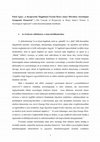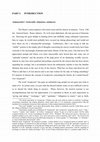Papers by Agnes Pokol dr.

A „kölcsönösség” és az olyan fogalmak, mint az „ajándék” és a „hála” több diszciplína
tárgykörébe... more A „kölcsönösség” és az olyan fogalmak, mint az „ajándék” és a „hála” több diszciplína
tárgykörébe tartozik—szociológia, antropológia, közgazdaságtan—de egyikben sem kellően
tisztán meghatározott és kellő mélységben tárgyalt. E fogalmak kapcsolódnak továbbá olyan
kérdésekhez, mint az egyén fogalma (az egyén viszonya saját magához), az egyén és a
„Másik” (Other) viszonya, az ember mint individuum és mint társas lény (social being)
problematikája, az emberi kapcsolatok kialakítása és fenntartása. Ezek szintén központi
fontosságúak számos tudományág terén—nemcsak a szociológia, a (morális) filozófia (moral
philosophy) és a pszichológia, de az irodalom terén is. Henry James munkássága kifejezetten
idevágó, hiszen egész életén át foglalkoztatta az irodalom erkölcsi dimenziója, a kulturális
viselkedésformák változatai (manners and mores), a társadalmi lét általában, valamint annak
vizsgálata, hogy hogyan is egyeztethető össze az ember számára egyénként és egyszerre társas
lényként való léte.
“Reciprocity” and such related concepts as “gift” and “gratitude” belong to several
disciplines—s... more “Reciprocity” and such related concepts as “gift” and “gratitude” belong to several
disciplines—sociology, anthropology, economics—yet they have been neither clearly defined
nor discussed as exhaustively as they merit. They bear further connection to the concept of
the self (the self‟s relation to itself), the relationship of self and other, the dilemma of being an
individual and simultaneously a social member, and the creation and maintenance of human
relationships, which are central questions of various disciplines once again—not only of
sociology, moral philosophy, and psychology, for instance, but also of literature. Henry
James is a case in point here with his lifelong preoccupation with the moral dimension of
literature, with manners and mores (culture), his general interest in social life and the viewing
of the individual as a social being.
Books by Agnes Pokol dr.

James’s emphasis on the importance of collecting firsthand (sense) experience—so concisely put i... more James’s emphasis on the importance of collecting firsthand (sense) experience—so concisely put in his “Paterian” “The Art of Fiction”—connects him even more than other advocates of realism to the ideal sociologist-novelist propounded by Beatrice Webb, who was said to have collected experience as a participant observer by way of personal immersion. James, the “observant stranger” (204), to use Leon Edel’s expression, had some initial difficulties in conquering Parisian society, while his success in London was almost instantaneous. In any case, it is easy to measure the extent of his socializing if we consider the staggering 140 times that he dined out during the winter of 1878-9. It was not always fun and games, though; giving himself “over to the social process with the same systematic care he had exercised in the planning of his professional career,” his immersion was more of a heroic feat, because not all the talk was “good talk, by any means,” the tables were too “heavily loaded,” and Victorian formality was nothing short of “stuffy” (224).
Despite his socializing, James had always remained an outsider who was something of a welcome curiosity with his American background. Sufficiently detached and immersed at the same time, the position he had created for himself as an American artist traveling and working in Europe did bear wonderful fruit. An example of this is the evergreen Jamesian issue of the clash between Europe and America. This is, furthermore, one of the fertile grounds to investigate the social context of individuals, which are so many different cultures with different attitudes towards the disposition to reciprocate. Yet another recurring Jamesian motif is the story of the innocent American girl’s quest for self in the guise of her adventure of coming to Europe, the land of experience, where she has to come to terms with the fragmented nature of reality and the existence of the Other if she is to grow up and become an independent individual (Fowler).
The greatest emphasis throughout my sociological analysis of the concept of reciprocity in Jamesian fiction is, therefore, placed on the endeavor to re-visit the story of Jamesian protagonists in order to investigate whether in the course of their moral education—their quest to grow up—they manage to acquire the essential disposition to reciprocate and whether they succeed or fail when it is put to the test. As to a “testing ground” for exchange (reciprocity), based on Simmel’s claim that every interaction is a kind of exchange, it is easy to see how all human relationships offer innumerable instances of transactions of give and take—be it conversation, love, or even an exchange of looks (43-4). Among the more salient examples, however, are those that deal specifically with some sort of gift, as in the case of Isabel Archer, who is presented with a whole fortune, or Maggie Verver, who is supposed to receive a wedding gift, which is to turn into the birthday present she is planning to give her father.
Although (gift) giving often seems the more challenging part of exchange, it is my aim to prove that taking is sometimes even more difficult—Isabel’s (and to a certain extent Milly’s) story shall demonstrate that. This is despite the fact that any social “association” (relation) is formed with an eye on the “social reward” one can get from the other—whether “intrinsic” (the individual her/himself as the source of interest/pleasure) or “extrinsic” (benefits “detachable” from the individual/association) (35-6, emphasis added).
Concerning the types of exchange between individuals, Bourdieu’s differentiation between forms of capital is to be of great relevance; the (innocent) wealthy American characters of the Jamesian world of fiction will be seen as transactors coming to Europe to exchange their economic capital for the social, cultural, human, symbolic, or erotic/sexual variety. This will be helpful in trying to demonstrate the underlying complexity of the numerous relationships between benefactors and beneficiaries. Or, more generally, it will facilitate the examination of the relationship between “the workers and the worked”—to anticipate the phraseology of Lancaster Gate in The Wings—which can be regarded as the epitome of the Jamesian concept of reciprocity.
In cases where the formation of personality has taken place before a character is met and so her or his moral education is supposed to have already been completed, the stress is to be on the evaluation of her/his character in situations where her/his reactions reveal whether—besides the moral sense (her/his use of perception and imagination complimented by the intelligent application of general moral rules as “rules of thumb”)—(s)he also possesses the disposition to reciprocate (and be grateful).
It is at this point that the aim of this analysis to go beyond the findings of James criticism may best be demonstrated. Departing from the premise already explained in “A brief apologia for (apparent) theoretical eclecticism,” namely that a multidisciplinary approach is—however unwittingly at times—generally accepted and practiced, I hereby claim that it is the very thing that helps me surpass what has been said in connection with Jamesian fiction. In the footsteps of Beatrice Webb, Lepenies has dwelt on the beneficial fusion of literature and sociology. Along Aristotelian lines, Nussbaum has hailed the fruitful dialogue of literature and philosophy (ethics), complimenting it with findings from the fields of psychology and anthropology.
My approach proposes to focus on such sociological aspects of (Jamesian) literature that have great relevance to moral philosophy, but have not as yet been investigated. Admittedly, exchange as a means of domination has already been analyzed to a certain extent (Freedman, Fluck). However, to concentrate on the concepts of reciprocity, gift, and gratitude in general, and in connection with the American girls’ moral education in particular, is to discover moral and social dimensions of Jamesian fiction hitherto left untouched. My method and focus are supposed to shed a new light on the (moral) conduct of several characters besides the three American girls of central importance (Isabel Archer, Milly Theale, and Maggie Verver); Maud Lowder, Lord Mark, Prince Amerigo, Charlotte Stant, and Adam Verver are perhaps the most salient examples when it comes to digging deeper into the motives of their (non) actions.
Furthermore, the dissertation is built up in a way that it may serve as a monography of Jamesian fiction that covers his whole oeuvre, proceeding from his early phase towards his last finished novel, The Golden Bowl. Moreover, besides such landmarks in his writing career as The Portrait of a Lady, The Wings of the Dove, and The Golden Bowl, I also analyze pieces that have not received so much attention, but bear relevance to a more complete understanding of the better-known works. An example of this may be “A Light Man,” “Longstaff’s Marriage,” and “Georgina’s reasons,” or even Watch and Ward.










Uploads
Papers by Agnes Pokol dr.
tárgykörébe tartozik—szociológia, antropológia, közgazdaságtan—de egyikben sem kellően
tisztán meghatározott és kellő mélységben tárgyalt. E fogalmak kapcsolódnak továbbá olyan
kérdésekhez, mint az egyén fogalma (az egyén viszonya saját magához), az egyén és a
„Másik” (Other) viszonya, az ember mint individuum és mint társas lény (social being)
problematikája, az emberi kapcsolatok kialakítása és fenntartása. Ezek szintén központi
fontosságúak számos tudományág terén—nemcsak a szociológia, a (morális) filozófia (moral
philosophy) és a pszichológia, de az irodalom terén is. Henry James munkássága kifejezetten
idevágó, hiszen egész életén át foglalkoztatta az irodalom erkölcsi dimenziója, a kulturális
viselkedésformák változatai (manners and mores), a társadalmi lét általában, valamint annak
vizsgálata, hogy hogyan is egyeztethető össze az ember számára egyénként és egyszerre társas
lényként való léte.
disciplines—sociology, anthropology, economics—yet they have been neither clearly defined
nor discussed as exhaustively as they merit. They bear further connection to the concept of
the self (the self‟s relation to itself), the relationship of self and other, the dilemma of being an
individual and simultaneously a social member, and the creation and maintenance of human
relationships, which are central questions of various disciplines once again—not only of
sociology, moral philosophy, and psychology, for instance, but also of literature. Henry
James is a case in point here with his lifelong preoccupation with the moral dimension of
literature, with manners and mores (culture), his general interest in social life and the viewing
of the individual as a social being.
Books by Agnes Pokol dr.
Despite his socializing, James had always remained an outsider who was something of a welcome curiosity with his American background. Sufficiently detached and immersed at the same time, the position he had created for himself as an American artist traveling and working in Europe did bear wonderful fruit. An example of this is the evergreen Jamesian issue of the clash between Europe and America. This is, furthermore, one of the fertile grounds to investigate the social context of individuals, which are so many different cultures with different attitudes towards the disposition to reciprocate. Yet another recurring Jamesian motif is the story of the innocent American girl’s quest for self in the guise of her adventure of coming to Europe, the land of experience, where she has to come to terms with the fragmented nature of reality and the existence of the Other if she is to grow up and become an independent individual (Fowler).
The greatest emphasis throughout my sociological analysis of the concept of reciprocity in Jamesian fiction is, therefore, placed on the endeavor to re-visit the story of Jamesian protagonists in order to investigate whether in the course of their moral education—their quest to grow up—they manage to acquire the essential disposition to reciprocate and whether they succeed or fail when it is put to the test. As to a “testing ground” for exchange (reciprocity), based on Simmel’s claim that every interaction is a kind of exchange, it is easy to see how all human relationships offer innumerable instances of transactions of give and take—be it conversation, love, or even an exchange of looks (43-4). Among the more salient examples, however, are those that deal specifically with some sort of gift, as in the case of Isabel Archer, who is presented with a whole fortune, or Maggie Verver, who is supposed to receive a wedding gift, which is to turn into the birthday present she is planning to give her father.
Although (gift) giving often seems the more challenging part of exchange, it is my aim to prove that taking is sometimes even more difficult—Isabel’s (and to a certain extent Milly’s) story shall demonstrate that. This is despite the fact that any social “association” (relation) is formed with an eye on the “social reward” one can get from the other—whether “intrinsic” (the individual her/himself as the source of interest/pleasure) or “extrinsic” (benefits “detachable” from the individual/association) (35-6, emphasis added).
Concerning the types of exchange between individuals, Bourdieu’s differentiation between forms of capital is to be of great relevance; the (innocent) wealthy American characters of the Jamesian world of fiction will be seen as transactors coming to Europe to exchange their economic capital for the social, cultural, human, symbolic, or erotic/sexual variety. This will be helpful in trying to demonstrate the underlying complexity of the numerous relationships between benefactors and beneficiaries. Or, more generally, it will facilitate the examination of the relationship between “the workers and the worked”—to anticipate the phraseology of Lancaster Gate in The Wings—which can be regarded as the epitome of the Jamesian concept of reciprocity.
In cases where the formation of personality has taken place before a character is met and so her or his moral education is supposed to have already been completed, the stress is to be on the evaluation of her/his character in situations where her/his reactions reveal whether—besides the moral sense (her/his use of perception and imagination complimented by the intelligent application of general moral rules as “rules of thumb”)—(s)he also possesses the disposition to reciprocate (and be grateful).
It is at this point that the aim of this analysis to go beyond the findings of James criticism may best be demonstrated. Departing from the premise already explained in “A brief apologia for (apparent) theoretical eclecticism,” namely that a multidisciplinary approach is—however unwittingly at times—generally accepted and practiced, I hereby claim that it is the very thing that helps me surpass what has been said in connection with Jamesian fiction. In the footsteps of Beatrice Webb, Lepenies has dwelt on the beneficial fusion of literature and sociology. Along Aristotelian lines, Nussbaum has hailed the fruitful dialogue of literature and philosophy (ethics), complimenting it with findings from the fields of psychology and anthropology.
My approach proposes to focus on such sociological aspects of (Jamesian) literature that have great relevance to moral philosophy, but have not as yet been investigated. Admittedly, exchange as a means of domination has already been analyzed to a certain extent (Freedman, Fluck). However, to concentrate on the concepts of reciprocity, gift, and gratitude in general, and in connection with the American girls’ moral education in particular, is to discover moral and social dimensions of Jamesian fiction hitherto left untouched. My method and focus are supposed to shed a new light on the (moral) conduct of several characters besides the three American girls of central importance (Isabel Archer, Milly Theale, and Maggie Verver); Maud Lowder, Lord Mark, Prince Amerigo, Charlotte Stant, and Adam Verver are perhaps the most salient examples when it comes to digging deeper into the motives of their (non) actions.
Furthermore, the dissertation is built up in a way that it may serve as a monography of Jamesian fiction that covers his whole oeuvre, proceeding from his early phase towards his last finished novel, The Golden Bowl. Moreover, besides such landmarks in his writing career as The Portrait of a Lady, The Wings of the Dove, and The Golden Bowl, I also analyze pieces that have not received so much attention, but bear relevance to a more complete understanding of the better-known works. An example of this may be “A Light Man,” “Longstaff’s Marriage,” and “Georgina’s reasons,” or even Watch and Ward.
tárgykörébe tartozik—szociológia, antropológia, közgazdaságtan—de egyikben sem kellően
tisztán meghatározott és kellő mélységben tárgyalt. E fogalmak kapcsolódnak továbbá olyan
kérdésekhez, mint az egyén fogalma (az egyén viszonya saját magához), az egyén és a
„Másik” (Other) viszonya, az ember mint individuum és mint társas lény (social being)
problematikája, az emberi kapcsolatok kialakítása és fenntartása. Ezek szintén központi
fontosságúak számos tudományág terén—nemcsak a szociológia, a (morális) filozófia (moral
philosophy) és a pszichológia, de az irodalom terén is. Henry James munkássága kifejezetten
idevágó, hiszen egész életén át foglalkoztatta az irodalom erkölcsi dimenziója, a kulturális
viselkedésformák változatai (manners and mores), a társadalmi lét általában, valamint annak
vizsgálata, hogy hogyan is egyeztethető össze az ember számára egyénként és egyszerre társas
lényként való léte.
disciplines—sociology, anthropology, economics—yet they have been neither clearly defined
nor discussed as exhaustively as they merit. They bear further connection to the concept of
the self (the self‟s relation to itself), the relationship of self and other, the dilemma of being an
individual and simultaneously a social member, and the creation and maintenance of human
relationships, which are central questions of various disciplines once again—not only of
sociology, moral philosophy, and psychology, for instance, but also of literature. Henry
James is a case in point here with his lifelong preoccupation with the moral dimension of
literature, with manners and mores (culture), his general interest in social life and the viewing
of the individual as a social being.
Despite his socializing, James had always remained an outsider who was something of a welcome curiosity with his American background. Sufficiently detached and immersed at the same time, the position he had created for himself as an American artist traveling and working in Europe did bear wonderful fruit. An example of this is the evergreen Jamesian issue of the clash between Europe and America. This is, furthermore, one of the fertile grounds to investigate the social context of individuals, which are so many different cultures with different attitudes towards the disposition to reciprocate. Yet another recurring Jamesian motif is the story of the innocent American girl’s quest for self in the guise of her adventure of coming to Europe, the land of experience, where she has to come to terms with the fragmented nature of reality and the existence of the Other if she is to grow up and become an independent individual (Fowler).
The greatest emphasis throughout my sociological analysis of the concept of reciprocity in Jamesian fiction is, therefore, placed on the endeavor to re-visit the story of Jamesian protagonists in order to investigate whether in the course of their moral education—their quest to grow up—they manage to acquire the essential disposition to reciprocate and whether they succeed or fail when it is put to the test. As to a “testing ground” for exchange (reciprocity), based on Simmel’s claim that every interaction is a kind of exchange, it is easy to see how all human relationships offer innumerable instances of transactions of give and take—be it conversation, love, or even an exchange of looks (43-4). Among the more salient examples, however, are those that deal specifically with some sort of gift, as in the case of Isabel Archer, who is presented with a whole fortune, or Maggie Verver, who is supposed to receive a wedding gift, which is to turn into the birthday present she is planning to give her father.
Although (gift) giving often seems the more challenging part of exchange, it is my aim to prove that taking is sometimes even more difficult—Isabel’s (and to a certain extent Milly’s) story shall demonstrate that. This is despite the fact that any social “association” (relation) is formed with an eye on the “social reward” one can get from the other—whether “intrinsic” (the individual her/himself as the source of interest/pleasure) or “extrinsic” (benefits “detachable” from the individual/association) (35-6, emphasis added).
Concerning the types of exchange between individuals, Bourdieu’s differentiation between forms of capital is to be of great relevance; the (innocent) wealthy American characters of the Jamesian world of fiction will be seen as transactors coming to Europe to exchange their economic capital for the social, cultural, human, symbolic, or erotic/sexual variety. This will be helpful in trying to demonstrate the underlying complexity of the numerous relationships between benefactors and beneficiaries. Or, more generally, it will facilitate the examination of the relationship between “the workers and the worked”—to anticipate the phraseology of Lancaster Gate in The Wings—which can be regarded as the epitome of the Jamesian concept of reciprocity.
In cases where the formation of personality has taken place before a character is met and so her or his moral education is supposed to have already been completed, the stress is to be on the evaluation of her/his character in situations where her/his reactions reveal whether—besides the moral sense (her/his use of perception and imagination complimented by the intelligent application of general moral rules as “rules of thumb”)—(s)he also possesses the disposition to reciprocate (and be grateful).
It is at this point that the aim of this analysis to go beyond the findings of James criticism may best be demonstrated. Departing from the premise already explained in “A brief apologia for (apparent) theoretical eclecticism,” namely that a multidisciplinary approach is—however unwittingly at times—generally accepted and practiced, I hereby claim that it is the very thing that helps me surpass what has been said in connection with Jamesian fiction. In the footsteps of Beatrice Webb, Lepenies has dwelt on the beneficial fusion of literature and sociology. Along Aristotelian lines, Nussbaum has hailed the fruitful dialogue of literature and philosophy (ethics), complimenting it with findings from the fields of psychology and anthropology.
My approach proposes to focus on such sociological aspects of (Jamesian) literature that have great relevance to moral philosophy, but have not as yet been investigated. Admittedly, exchange as a means of domination has already been analyzed to a certain extent (Freedman, Fluck). However, to concentrate on the concepts of reciprocity, gift, and gratitude in general, and in connection with the American girls’ moral education in particular, is to discover moral and social dimensions of Jamesian fiction hitherto left untouched. My method and focus are supposed to shed a new light on the (moral) conduct of several characters besides the three American girls of central importance (Isabel Archer, Milly Theale, and Maggie Verver); Maud Lowder, Lord Mark, Prince Amerigo, Charlotte Stant, and Adam Verver are perhaps the most salient examples when it comes to digging deeper into the motives of their (non) actions.
Furthermore, the dissertation is built up in a way that it may serve as a monography of Jamesian fiction that covers his whole oeuvre, proceeding from his early phase towards his last finished novel, The Golden Bowl. Moreover, besides such landmarks in his writing career as The Portrait of a Lady, The Wings of the Dove, and The Golden Bowl, I also analyze pieces that have not received so much attention, but bear relevance to a more complete understanding of the better-known works. An example of this may be “A Light Man,” “Longstaff’s Marriage,” and “Georgina’s reasons,” or even Watch and Ward.